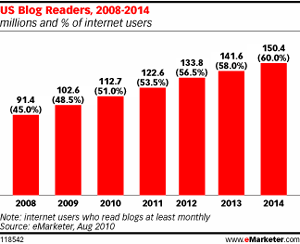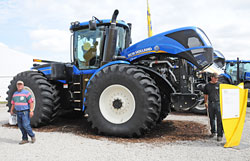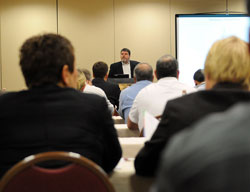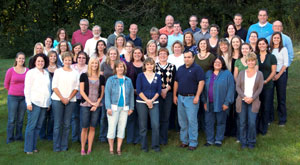 Blogging continues to grow in spite of all the naysayers who have thought it wouldn’t “go anywhere.” In fact, I’d dare say that many people who read online content don’t even know they’re on a blog and don’t really care. As you’ll see in a comment from the author of a new eMarketer report (The Blogosphere: Colliding with Social and Mainstream Media), “. . . Over time, blogs will continue to become indistinguishable from other media channels,” blogging has become sort of mainstream. Who’d have thought?
Blogging continues to grow in spite of all the naysayers who have thought it wouldn’t “go anywhere.” In fact, I’d dare say that many people who read online content don’t even know they’re on a blog and don’t really care. As you’ll see in a comment from the author of a new eMarketer report (The Blogosphere: Colliding with Social and Mainstream Media), “. . . Over time, blogs will continue to become indistinguishable from other media channels,” blogging has become sort of mainstream. Who’d have thought?
But blogs continue to be important. eMarketer estimates that this year more than half of internet users will read blogs at least monthly. By 2014, readership will rise to more than 150 million Americans, or 60% of the internet population in the US. One reason for the rise in readership is that blogs have become an accepted part of the online media landscape.
I love that. “an accepted part of the online media landscape.” As if it isn’t already. The reason some don’t think it already is has most to do with their own fear or dislike of the mechanism and those of us who have chosen it as our information publishing platform. Or maybe it’s something else. What do you think?
What’s New From Pioneer Hi-Bred
 I’ve been looking for an excuse to post a Kip Cullers photo and decided the time was right. Kip, the king of bionic ag, is modeling at Farm Progress Show with an iPad showing what’s new with Pioneer Hi-Bred. That’s my connection here since I actually have an interview I did with Pioneer’s Drew Porter.
I’ve been looking for an excuse to post a Kip Cullers photo and decided the time was right. Kip, the king of bionic ag, is modeling at Farm Progress Show with an iPad showing what’s new with Pioneer Hi-Bred. That’s my connection here since I actually have an interview I did with Pioneer’s Drew Porter.
Drew says the biggest news is Optimum AcreMax 1, “the industry’s first
in-the-bag solution for corn rootworm refuge.” He says it helps place the right product on the right acre. In the future they will “continue to focus on additional reduced refuge technologies to bring even that next level of simplicity to the Optimum AcreMax platform.” They’re also very excited to be showcasing the Y Series soybean lineup using accelerated yield technology.
You can listen to my interview with Drew here: Drew Porter Interview
New Holland Commitment To Tier IV
 I have participated in a seminar on the new Tier IV engine requirements which go into effect this coming January and found myself very lost. I’m not that kind of engineer. To help understand it better I spoke with New Holland’s Sean Dorosz at the Farm Progress Show. Pictured is a New Holland T9 Series Tractor that will support the new technology.
I have participated in a seminar on the new Tier IV engine requirements which go into effect this coming January and found myself very lost. I’m not that kind of engineer. To help understand it better I spoke with New Holland’s Sean Dorosz at the Farm Progress Show. Pictured is a New Holland T9 Series Tractor that will support the new technology.
“We don’t simply consider Tier IV as a legal requirement, but as a part of our fundamental role of agricultural machinery manufacturers which safeguards the farming environment for future generations,” says David Greenberg, Senior Director of Marketing, North America. “New Holland’s Clean Energy Leader position is based on fundamental elements for environmental respect that encompass not only Tier IV, but also biodiesel, the NH2TM hydrogen tractor and the Energy Independent Farm concept.”
As the Tier IVa regulations for products with engines over 174hp (130kW) go into effect in January 2011, New Holland will use selective catalytic reduction (SCR) technology for all machines producing over 100 hp. The advanced SCR engine solution was developed in partnership with Fiat Powertrain Technologies. SCR is a cool-running, quiet system that’s separate from the main engine function and does not compromise horsepower or torque. It does not interfere with engine performance but, in fact, actually improves it. The SCR after-treatment requires an easy-to-use additive.
You can listen to my interview with Sean here: Sean Dorosz Tier IV Interview
A Swine Health 3-Way Called 3FLEX
 They really need to simplify the pronunciation of these swine diseases. However, when it comes to simplifying how to treat them Boehringer Ingelheim has that covered with 3FLEX.
They really need to simplify the pronunciation of these swine diseases. However, when it comes to simplifying how to treat them Boehringer Ingelheim has that covered with 3FLEX.
THE ONLY USDA-APPROVED COMBINATION PACKAGE FOR PORCINE CIRCOVIRUS, MYCOPLASMA HYOPNEUMONIAE AND PRRS
Boehringer Ingelheim Vetmedica, Inc. brings you the 3FLEX™ combination package, the first 3-way combination approved by the USDA to be mixed and administered as a single shot for pigs three weeks of age or older.
EASY AS 1-2-3
By mixing and administering Ingelvac CircoFLEX® 1, Ingelvac MycoFLEX® 2 and Ingelvac® PRRS MLV 3 in one 2 mL shot, you’re protecting your herd against three of the most critical diseases in the Porcine Respiratory Disease Complex (PRDC) and the swine industry. You’re also reducing stress on pigs and people, and reducing labor costs.
The technical manager for BIVI on this product is Dr. Greg Cline who spoke at the company’s weekend seminar I attended. He presented research that shows the effectiveness of the product. You can listen to my interview with Dr. Cline here: Dr. Greg Cline Interview
Harold Beaver Wins John Deere Chip Foose 4020 Tractor
 John Deere just announced the winners of their Big Buck Sweepstakes. The big prize winner is Harold Beaver who receives the Chip Foose customized John Deere 4020 Tractor.
John Deere just announced the winners of their Big Buck Sweepstakes. The big prize winner is Harold Beaver who receives the Chip Foose customized John Deere 4020 Tractor.
As the grand prize winner of the John Deere Big Buck Sweepstakes, Beaver not only won the customized John Deere 4020 Tractor but also met and talked with Chip Foose, who designed and modified one of Deere’s most widely used and popular tractor models ever produced. From March through July, the Big Buck 4020 Tractor toured the country as part of the John Deere Drive Green Tractor Experience events.
Beaver filled out the winning entry at the James River Equipment John Deere dealership in Statesville, North Carolina, when he was getting parts for a lawnmower. He thought it was a great idea to use Chip Foose to promote the John Deere 4020.
In addition to the grand prize Foose-customized 4020 Tractor, John Deere is giving away three Gator XUVs as first-place prizes. Recipients of these prizes are: Stephen Hendricks, St. Louis, Mo.; Philip Cripe, North Manchester, Ind.; Robert Leis, Togo, Saskatchewan, Canada.
Zimfo Bytes
- The Oklahoma Beef Council announced a $250,000 gift to Oklahoma State University’s newly created endowed professorship in honor of animal scientist and autistic expert Dr. Temple Grandin whose life story, put to film, recently won seven Emmy’s.
- Agriculture Secretary Tom Vilsack announced five new inductees into the USDA Hall of Heroes. Click here for the complete list.
- New leadership has been elected by the Farm Financial Standards Council which recently held its 2010 conference and annual meeting.
- FMC Corporation announced the introduction of Authority XL Herbicide, part of the Authority herbicide line of products for soybeans.

JoAnn Alumbaugh Joins McCormick Company
 Congratulations to JoAnn Alumbaugh on her new job with McCormick Company!
Congratulations to JoAnn Alumbaugh on her new job with McCormick Company!
JoAnn has been working for Farms.com and has been a solid supporter of professional organizations like the American Agricultural Editors Association and International Federation of Agricultural Journalists. I hope she knows that the fine print in her membership said she had to stay involved “for life” even if she made a career move. LOL.
JoAnn is pictured kissing her “Best Dressed Minnesotan” award at the Ag Media Summit. Notice she’s holding up her “mini soda.” Get it? Yeah, took me a minute too.
Have you made a career move? Let the AgWired community know. We like to keep up.
Farm Market iD Partners with Successful Farming
 Successful Farming® and Farm Market iD have joined forces to create “SFMiD,” what they are calling “the most comprehensive agricultural and rural lifestyle database in the industry.” SFMid will offer a wide variety of options for multi‐sourced farm and rural lifestyle data, as well as customized solutions to help agrimarketers better understand owner/operator relationships, establish electronic communication data points, and know the farmer as an individual person.
Successful Farming® and Farm Market iD have joined forces to create “SFMiD,” what they are calling “the most comprehensive agricultural and rural lifestyle database in the industry.” SFMid will offer a wide variety of options for multi‐sourced farm and rural lifestyle data, as well as customized solutions to help agrimarketers better understand owner/operator relationships, establish electronic communication data points, and know the farmer as an individual person.
 That got our attention, so we called John Montandon, President of Farm Market iD, to find out more about what this new partnership has to offer. In this ZimmCast, John talks about how they are using the latest technology – both in communications and agriculture – to offer agrimarketers the most comprehensive information about their customers.
That got our attention, so we called John Montandon, President of Farm Market iD, to find out more about what this new partnership has to offer. In this ZimmCast, John talks about how they are using the latest technology – both in communications and agriculture – to offer agrimarketers the most comprehensive information about their customers.
Find out more here: ZimmCast 273
Thanks to our ZimmCast sponsors, Novus International, and Leica Geosytems for their support.
The ZimmCast is the official weekly podcast of AgWired. Subscribe so you can listen when and where you want. Just go to our a Subscribe page
The Evolution of Online Agvocacy
While in Chicago I finally got to meet Kelly Rivard who I’ve been connected with via AgChat for some time. She was a participant in the first ever AgChat Foundation Agvocacy 2.0 Training Conference and produced a great video for it. Kelly is also a student at North Central College in Naperville, IL.
Farmers have a story and are learning to tell it more and more. This video was featured at the opening session of the AgChat Foundation’s first ever “Agvocacy 2.0 Training Conference” in Rosemont, Illinois where 50 farmers gathered to learn more about the tools of the trade.
“Agvocacy” is the term coined to represent the act of advocating agriculture. The AgChat Foundation works to empower a community of connected and enthusiastic “agvocates” through social media. This video gives insight on some of the tools used and some of the facts that drive the agvocacy campaign. Every farmer and rancher has a story, and it is time for them to share it.
Charleston|Orwig Goes Blue For Global Genes Project
 I’ve heard of going green but going blue is good too. That’s what the staff at Charleston|Orwig, Inc. is doing by wearing blue jeans each day during September. They’re doing it “not for comfort, but for hope.”
I’ve heard of going green but going blue is good too. That’s what the staff at Charleston|Orwig, Inc. is doing by wearing blue jeans each day during September. They’re doing it “not for comfort, but for hope.”
Wearing jeans serves as a reminder to vote for the Global Genes Project in the online Pepsi Refresh Program.
“We are partnering with the Children’s Rare Disease Network to support the Global Genes Project, which is a grassroots effort to raise awareness for children suffering from rare diseases,” said Mark Gale, president at C|O. “We are wearing jeans as part of the ‘wear that you care’ concept, and as a reminder to vote every day at vote4hope.org.”
There are currently more than seven thousand rare diseases identified, affecting 30 million people in the U.S. alone, 75 percent of whom are children. The Global Genes Project raises awareness of genetic diseases and generates funds to promote collaborative research into disease causes and treatments. Read More
